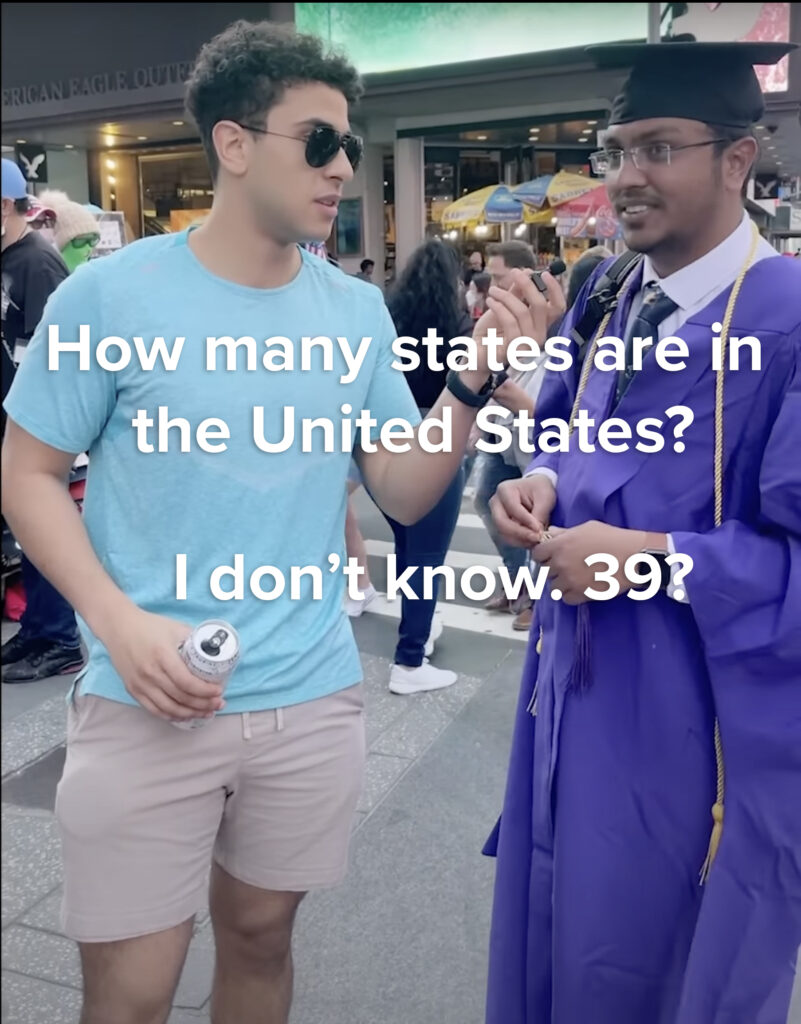
You may have seen the popular meme floating around YouTube. A guy walks around Times Square and asks random people questions like “Who is our vice president?” or “What is 3 x 3 x 3?” or “Who fought in the American Civil War?” or “Name a continent.” Person after person fails to answer these basic questions correctly. You laugh and think to yourself, “I can’t believe these people don’t know this stuff.”
But what if the questions were something like “Explain Euclid’s proof for the existence of infinite prime numbers.” or “Who was Thomas Beckett?” If the people in the video could not answer those questions, many viewers, who also couldn’t answer the questions, might react with something like “Why would anyone need to know that? If you need to know the answers to those questions, you can just Google it.” The thing is, we can Google just about anything, including the name of our vice president, 3 x 3 x 3, and the name of any continent. Why do we need to know those things? Are there things we should know? And if so, what are those things? Do we really need to keep a certain set of facts in our heads to be considered an educated person? What does it mean to be an educated person in a world where you can ask Siri just about anything?
These are the questions we ask ourselves at Veritas Christi. Most schools concentrate on giving students information and practicing skills that can be easily measured. We like questions with correct and incorrect answers because they are easy to grade. We can look at the data and say, “That student has shown he knows the items on the rubric. He is educated.” But these kinds of evaluations do not demonstrate that the student is educated.
In his excellent book “Norms and Nobility a Treatise on Education” (University Press of America, 1999) David Hicks asserts that “the end of education is not thinking; it is acting.”
AI can write papers that contain accurate information using excellent grammar. But AI cannot tell someone how they should act in the world. It is easy to find facts, and to gather data. It is much more difficult to interpret data, and to use facts wisely to make decisions about what kind of laws to pass, or when to take a stand for or against something, or how to vote, or what kind of policies to make, or what goals should we pursue.
My students laugh when I don’t know the name of the most famous country music star. I don’t care, I can Google it. But when we read Plutarch’s Coriolanus and I ask “Did Marcius and the Senate respond to the people wisely when they asked for lower prices to buy grain after they served Rome in the Volscian wars?” or “Could Coriolanus have done anything differently that would have resulted in him not being exiled?” Google can’t help. Discussing these kinds of questions will yield a kind of education that creates people who can act.
When we talk about Euclid’s proof of infinite prime numbers, we are practicing the act of looking at a problem from it’s opposite to determine if we can discover a solution. It’s about acting in the world. When we talk about Thomas Beckett, we are thinking about friendship, betrayal, power, and authority. How should we act when we feel betrayed by a friend? How do we recover from a terrible blunder? Wrestling with these ideas is what education is about.
We all carry the world in our pockets. We’ve got access to plenty of facts,. Our hope for our students is to train them to be discerning thinkers, eloquent communicators and virtuous ambassadors of Christ who act with wisdom in that world.
